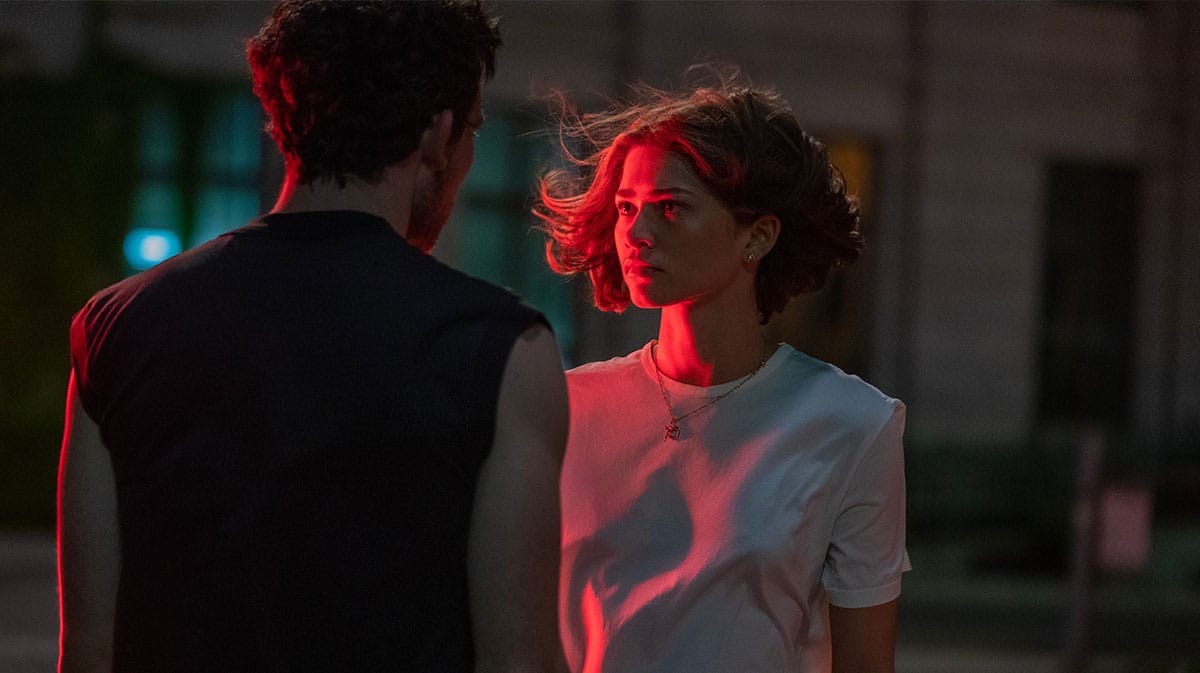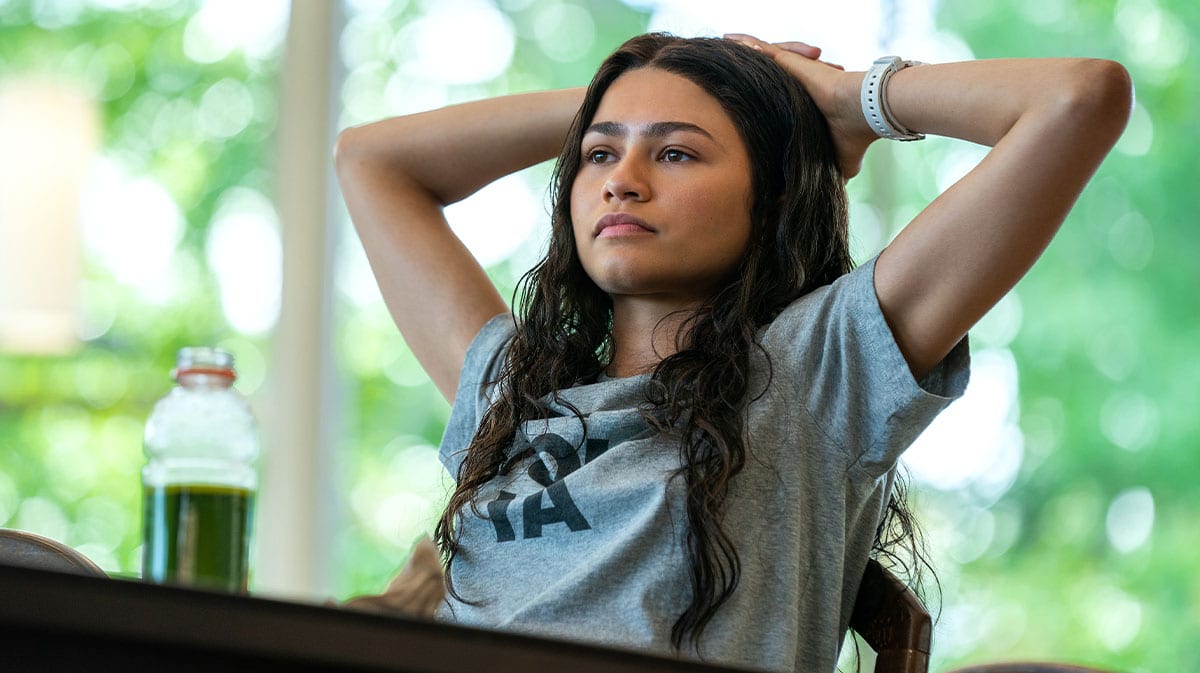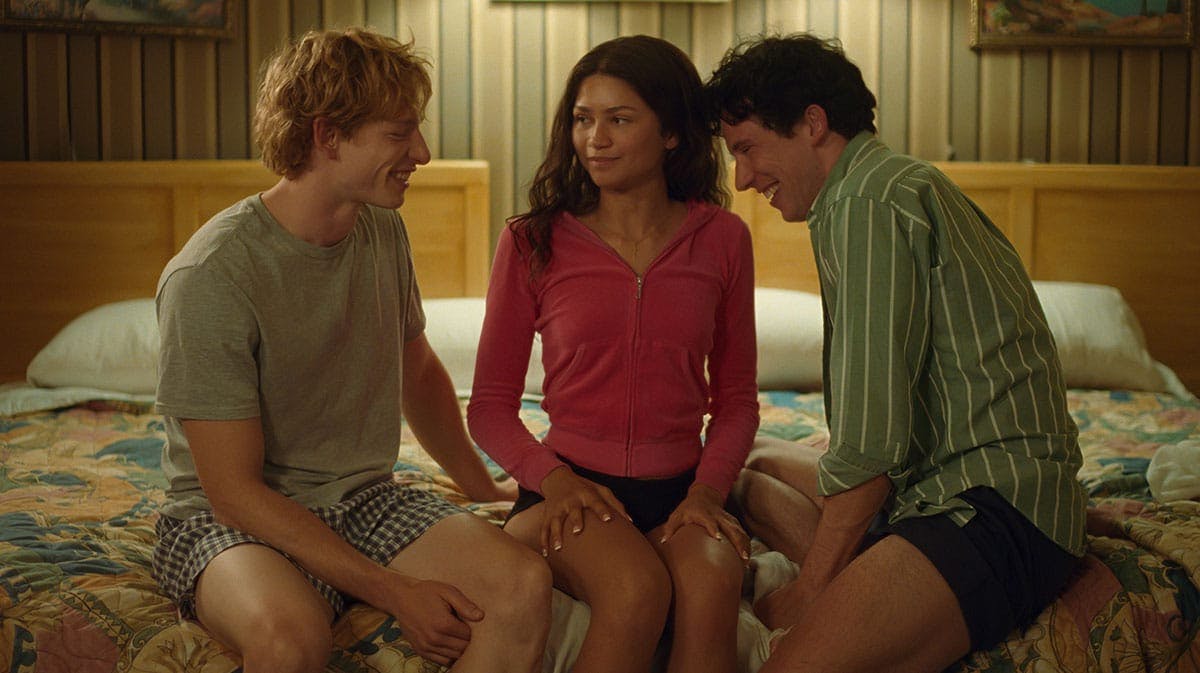Challengers, Luca Guadagnino's Zendaya-starring love-triangle romp, has its characters remind you, more than once: It isn’t about tennis.
Not the score, anyway.
The sweat and the tension? Warmer. Hot, in fact.
Challengers review

The story of Challengers rallies back and forth (a little too much) across three timelines. At an Adidas party in 2006, doubles partners and boarding school roommates Art Donaldson (Mike Faist) and Patrick Zweig (Josh O’Connor) meet Tashi Duncan (Zendaya) — a fierce, seductive prodigy destined for Stanford and superstardom.
A daffy afterparty meet-cute finds the teens drinking beers, giggling away, and sharing a much-talked-about kiss.
“I don't want to be a home-wrecker,” she teases. As the three-way kiss becomes two, Tashi slips away, with a devilish, accomplished grin. The camera follows her.
The long-hyped scene underscores the driving forces that will contextualize this playful, contained saga: The boys' underlying sexual tension, and Tashi’s fierceness about getting what she wants — perhaps just for the sake of it. For better or worse, that’s all we learn about the film's only characters of note.
13 years later, in the “present-day” timeline of 2019, Art and Tashi — who initially dated Patrick — are partners with a daughter. In between, Tashi’s career has been derailed by a devastating injury. (DP Sayombhu Mukdeeprom’s most effective shot is Tashi’s knee dislocating — the lone tragic moment in the movie.)
Art needs to win the U.S. Open to complete the career Grand Slam, then he wants to retire. He’s fallen out of love with tennis, or ATP Tour life, or might just be suffering from a crisis of confidence. We don't really know, although vague notions of class-based comfort are hinted at; contrasted with Patrick's scrappiness. Tashi, challenging her fire as Art's coach, books him a low-level challenger event at an amusingly unglamorous localized setting of New Rochelle, New York. Art draws Patrick.
Faist (West Side Story) makes a convincing tennis player, though Art is devoid of eccentricity. Zweig — by nature of O’Connor’s (The Crown) humanist performance, plus the character’s hardship — feels more realized. Vitally, the three leads have palpable chemistry.
A gravitational force
Because she's played by Zendaya, the film insists that Tashi is a gravitational force. (There are comical slow-motion shots of Zendaya that might as well be a Valentino commercial; characters literally utter that she's the hottest person they’ve ever seen.)
Zendaya capably holds the screen, of course. The lack of context around what drives Tashi other than the irresistible allure of winning!, though, restricts the performance (the movie's goofier romantic-comedy sequences feature the men). Tashi is fierce, but is she interesting?
The movie's intelligence lies in its commitment to containment and attention to detail. Merissa Lombardo's production design impressively captures not just the milieu of, say, the 2012 Western & Social Financial Open in Cincinnati — via period-specific Babolat bags, ESPN2 graphics, Gatorade bottles, etc. — but also the leisurely feeling of being at these tournaments: how people linger around and kill time waiting for matches.
Look, you hire Luca Guadagnino for a reason. He took a titillating screenplay (by first-time scribe Justin Kuritzkes) about one specific romantic dynamic based on a Serena Williams match, and got the green light to have a blast within that sandbox. Guadagnino's palpable affection for the actors and assignment is inviting. The costuming of J.W. Anderson, creative director of Loewe, is superb.
Guadagino deploys a bottomless bag of flourishes — dizzying shots from the ball's POV, rapid-fire crosscutting, comically amped-up thwacking of racket contact — to dynamize the tennis scenes instead of simply making them shorter. The filmmaking feels as athletic as its stars (the actors each have one stroke down pat), even if Marco Costa's kinetic editing feels exhaustive, perhaps intentionally, by the end of its two-hour, 11-minute matchtime.
Should you watch Challengers?

Ultimately, Luca Guadagnino's Challengers delights in its playfulness, even if the action — due to the minor plot and sketched characters — overly depends upon the relentlessly pulsating Trent Reznor and Atticus Ross Eurohouse soundtrack (one time playing over a mention of Facebook, and under an intense sauna conversation) for propulsion.
I’d be wary of heaping too much reverence on Challengers for being an Important Work of Art, despite its prestige sheen and originality. After all, the movie opted against challenging itself in favor of fun.
But, that's OK. Challengers is trying to be commercial while basking in its thematic smallness and specificity. Is the ending a predictable bail-out? Of course. But the movie never cared about who wins or loses the match, or what it means for their careers. It's about the psychosexual baggage amassed along the way.
Grade: B+
Challengers is in theaters.
